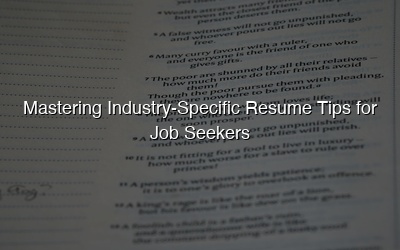Mastering Industry-Specific Resume Tips for Job Seekers
In today’s competitive job market, crafting a resume that stands out is crucial. Each industry has its specific standards and requirements that can significantly influence how your resume is perceived. Understanding these nuances can be the difference between landing an interview and being overlooked. This guide offers industry-specific resume tips that will help you tailor your resume to meet professional standards and align with industry requirements.
Understanding the Importance of Industry-Specific Resumes
When applying for jobs, your resume is often your first impression. Sector-specific advice is critical for several reasons:
Relevance: Tailoring your resume to a specific industry shows employers you understand their field.
Competitiveness: Different sectors prioritize different skills and experiences, and a targeted resume can help you stand out among candidates.
Credibility: A resume that reflects industry standards reinforces your professionalism and expertise.General Tips for All Industries
Before diving into specific sectors, here are some general tips to keep in mind:
Clear Formatting: Use clean, professional layouts. Avoid excessive graphics, especially in traditional industries.
Action Verbs: Start bullet points with strong action verbs to demonstrate your achievements.
Tailor Each Resume: Customize your resume for each application. Use keywords from the job description to pass through Applicant Tracking Systems (ATS).
Quantify Achievements: Wherever possible, use numbers to highlight your accomplishments.Technology Resume Tips
The technology industry values innovation, problem-solving, and technical skills. Here’s how to tailor your tech resume:
Emphasize Technical Skills
List Technical Proficiencies: Include programming languages, tools, and technologies relevant to the position.
Certifications Matter: Highlight any relevant certifications (e.g., AWS, Cisco) that demonstrate your expertise.Showcase Projects
Project Descriptions: Include a section dedicated to personal or professional projects, detailing your role, the technologies used, and the outcomes.
Collaboration and Impact: Mention teamwork experiences and the impact of your work on the project and the company.Format for Readability
Use a Clear Structure: Break down sections such as skills, experience, and education for easy scanning.
Links to Work Samples: If applicable, include links to your GitHub, portfolio, or live projects.Healthcare Resume Tips
Healthcare resumes must convey both qualifications and a deep understanding of patient care and regulations. Here’s how:
Highlight Certifications and Licenses
Include Relevant Licenses: Licenses like RN, LPN, or any specialized certifications should be prominently displayed.
Continuing Education: Mention any ongoing education or training relevant to your field (e.g., CPR, patient care).Focus on Soft Skills
Emphasize Communication and Compassion: Highlight experiences that demonstrate your ability to communicate effectively and show empathy.
Teamwork in Healthcare: Showcase experiences working in multidisciplinary teams.Clinical Experience
Detail Your Experience: Include clinical rotations, internships, or relevant volunteer work, emphasizing your role and responsibilities.
Use Medical Terminology: Familiarity with medical terminology can enhance credibility, but ensure clarity for less technical roles.Finance Resume Tips
In the finance sector, precision and analytical skills are paramount. Here are specific tips:
Quantitative Achievements
Use Numbers: Highlight achievements with specific data (e.g., “increased portfolio performance by 20% over three years”).
Risk Management: If applicable, discuss your experience with risk assessment and management strategies.Relevant Financial Software
List Software Proficiency: Mention familiarity with financial software (e.g., QuickBooks, SAP) and any analytical tools (e.g., Excel, Tableau).
Certifications: Relevant certifications (e.g., CFA, CPA) should be highlighted prominently.Professional Formatting
Conservative Layout: Use a standard format; avoid overly creative designs. Finance is a conservative field, and professionalism is key.
Bullet Point Clarity: Use bullet points to make your experiences easily digestible and to showcase your achievements clearly.Creative Resume Tips
For those in creative industries, your resume is a reflection of your style and creativity. Here are some tailored tips:
Showcase Your Portfolio
Visual Elements: Integrate design elements that reflect your creativity, but ensure they do not detract from the content.
Link to Work Samples: Include a portfolio section with links to your best work, whether it’s art, writing, or digital design.Personal Branding
Unique Personal Statement: Write a compelling personal statement that reflects your unique voice and style.
Highlight Unique Skills: Emphasize creative skills like storytelling, design thinking, or multimedia production.Networking and Collaborations
Collaborative Projects: Mention any collaborative projects that showcase your ability to work with others creatively.
Social Media Presence: If relevant, include links to your professional social media accounts (e.g., LinkedIn, Behance) to showcase your work and network.Conclusion
Crafting an effective resume requires understanding the nuances of the industry you are targeting. By following these industry-specific resume tips, you can create a document that not only highlights your skills and experiences but also aligns with professional standards and industry requirements. Whether you’re in technology, healthcare, finance, or the creative sector, tailoring your resume will significantly enhance your chances of landing interviews and, ultimately, your dream job.
Call to Action
Ready to take your resume to the next level? Get industry-specific resume advice for your field today and start your journey towards career success!
